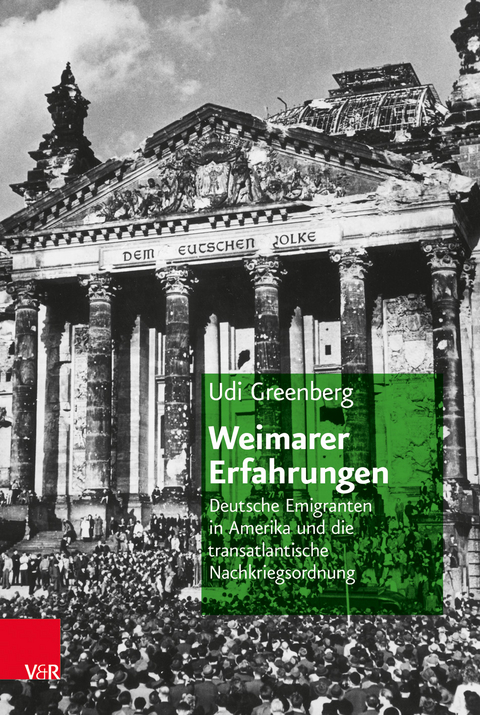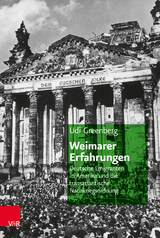Weimarer Erfahrungen
Deutsche Emigranten in Amerika und die transatlantische Nachkriegsordnung
Seiten
2021
Vandenhoeck & Ruprecht (Verlag)
978-3-525-37058-2 (ISBN)
Vandenhoeck & Ruprecht (Verlag)
978-3-525-37058-2 (ISBN)
Die ideengeschichtliche Prägung des demokratischen Neuanfangs in Deutschland nach 1945 durch die Weimarer Erfahrungen von fünf Emigranten.
This study examines the origins of two incisive processes: the transformation of post-war Germany from a National Socialist Volksgemeinschaft to a liberal democracy and the ideological genesis of the Cold War. Its central objects of study are five German emigrants: the political theorist and Protestant Carl J. Friedrich, the Socialist political scientist Ernst Fraenkel, the Catholic publicist Waldemar Gurian, the liberal lawyer Karl Loewenstein, and finally Hans Morgenthau, a political scientist, lawyer, and theoretician in the field of international relations. They had all been intensively involved in the political debates of the Weimar era, had survived National Socialism in exile in the United States, and all went on to become influential American intellectuals and political advisors. Udi Greenberg traces their paths and demonstrates through the application of approaches from intellectual history and politics that experiences from the Weimer Republic became foundational for Germany's democratic reconstruction as well as for the transatlantic post-war order. Beginning in the interwar period in Germany and reaching until the end of the East/West conflict, this study illuminates five figures, their ideas, and the resulting political decision-making that was to have an enduring impact on Germany's relationship to America as well as on the fabric of the Cold War.
This study examines the origins of two incisive processes: the transformation of post-war Germany from a National Socialist Volksgemeinschaft to a liberal democracy and the ideological genesis of the Cold War. Its central objects of study are five German emigrants: the political theorist and Protestant Carl J. Friedrich, the Socialist political scientist Ernst Fraenkel, the Catholic publicist Waldemar Gurian, the liberal lawyer Karl Loewenstein, and finally Hans Morgenthau, a political scientist, lawyer, and theoretician in the field of international relations. They had all been intensively involved in the political debates of the Weimar era, had survived National Socialism in exile in the United States, and all went on to become influential American intellectuals and political advisors. Udi Greenberg traces their paths and demonstrates through the application of approaches from intellectual history and politics that experiences from the Weimer Republic became foundational for Germany's democratic reconstruction as well as for the transatlantic post-war order. Beginning in the interwar period in Germany and reaching until the end of the East/West conflict, this study illuminates five figures, their ideas, and the resulting political decision-making that was to have an enduring impact on Germany's relationship to America as well as on the fabric of the Cold War.
Udi Greenberg ist Historiker und Associate Professor of History am Dartmouth College, New Hampshire.
| Erscheinungsdatum | 18.09.2018 |
|---|---|
| Übersetzer | Felix Kurz |
| Zusatzinfo | mit 9 Abb. |
| Verlagsort | Göttingen |
| Sprache | deutsch |
| Original-Titel | The Weimar Century |
| Maße | 160 x 237 mm |
| Gewicht | 707 g |
| Themenwelt | Geschichte ► Allgemeine Geschichte ► Zeitgeschichte |
| Schlagworte | Emigration • Exil • Kalter Krieg • Nationalsozialismus • Weimarer Republik • Zwischenkriegszeit |
| ISBN-10 | 3-525-37058-X / 352537058X |
| ISBN-13 | 978-3-525-37058-2 / 9783525370582 |
| Zustand | Neuware |
| Haben Sie eine Frage zum Produkt? |
Mehr entdecken
aus dem Bereich
aus dem Bereich
Gewalt, Umwelt, Identität, Methode
Buch | Softcover (2024)
Spector Books OHG (Verlag)
CHF 49,95
wie Freud im Kollektiv verschwand
Buch | Hardcover (2024)
Klett-Cotta (Verlag)
CHF 34,95




